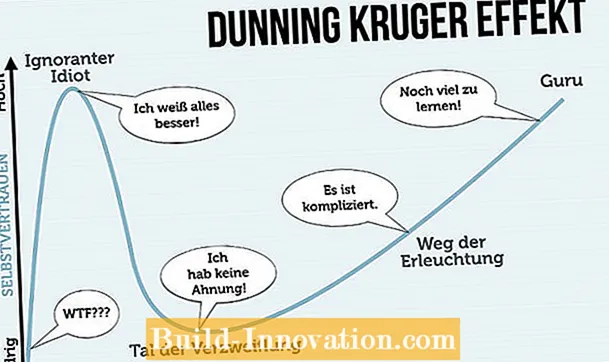Coffee Is Healthy: 12 Amazing Facts About Coffee

Content
- What makes coffee so healthy?
- 12 amazing reasons coffee is healthy
- How many cups of coffee a day are healthy?
- Coffee and the side effects
- Coffee is not a liquid scavenger
- Coffee consumption in Germany
- Caffeine kick: best in the morning!
- Everything Latte: What coffee reveals about your personality
- Coffee drinkers and personality types
- 5 reasons why coffee drinkers are more successful
- Occupational groups: who drinks the most coffee?
"I need some coffee now!" You might be thinking. If we can understand, we often feel the same way. Coffee not only gives us a kick, it is - in moderation - even healthy and can do more than you think. Or did you know that coffee can lower the risk of Alzheimer's? Coffee drinkers are also said to develop liver cancer up to 40 percent less often. The brewed drink contains various antioxidants, including cafestol and kahweol, which counteract liver fibrosis. One roasted coffee a day does not save a doctor. However, there are now numerous positive and proven effects of coffee on health. 12 amazing reasons why coffee is healthy can be found in this article. Plus 5 reasons why coffee drinkers are more successful ...
What makes coffee so healthy?
What effects does coffee really have on our health? Numerous scientific studies and researchers have already dealt with the question. Like beans, they come in the typical 500 gram package. Not all are as independent as they are. However, a British meta-study that evaluated more than 200 such studies came to the conclusion that coffee had around 19 positive effects on health. For comparison: there were only six negative effects. In particular, the risk of cardiovascular diseases such as heart attacks or strokes is reduced by drinking coffee.
What makes roasted coffee so healthy, are - according to British scientists - its antioxidant ingredients. Coffee is a “complex mixture of over 1000 bioactive compounds” and more than 800 aromatic substances. Everyone processes them differently. Nevertheless, together they usually have a stimulating, anti-inflammatory, even anti-cancer effect. The bronchi are also slightly dilated when drinking coffee, which in turn improves the oxygen supply.
12 amazing reasons coffee is healthy
- Coffee increases the ability to think
As researchers at Johns Hopkins University in Baltimore have found, coffee or the caffeine it contains is not only a stimulant - it also improves memory. Just 200 milligrams of caffeine increase memory and help with learning. - Coffee can relieve pain
About that of a sore muscles. Studies have shown that even moderate amounts of two cups of coffee could help relieve pain. - Coffee can be sexually arousing
Especially women. At least that's what Fay Guarraci of Southwestern University in Georgetown, Texas claims to have found. After that, caffeine stimulates the same areas of the brain that are responsible for the level of sexual arousal. - Coffee lowers the risk of diabetes
To be more precise: that of type 2 diabetes, by an impressive 50 percent. But only for those who drink four cups a day. Every additional cup reduces the risk by another seven percent, according to a study by the American Chemical Society. - Coffee against helps against bad breath
Because some substances in coffee have an antibacterial effect, they ensure better breath and less bad breath, according to a study by the Israeli University of Tel Aviv. However, coffee with milk makes your breath worse again. Reason: In the oral cavity, bacteria break down milk and coffee back into malodorous substances. - Coffee prevents Parkinson's
This is what Ronald Postuma claims, who found in his research that people who consume caffeine regularly are less likely to develop Parkinson's than others. - Even the smell of coffee lowers the stress level
In experiments with rats, scientists from Seoul National University were able to observe that those animals that were exposed to coffee aromas already showed differences in brain proteins, which in turn reduced the feeling of stress and fatigue. - Caffeine and glucose make you smart
Coffee and cake in the afternoon - a good idea! Josep M. Serra Grabulosa from the University of Barcelona found out that while we sip an espresso and nibble on a sweet snack, we stimulate our gray matter. Brain scans in the magnetic tomograph showed that the combination of caffeine and glucose increased the subjects' cognitive processes, in particular attention, memory and thinking efficiency. - Coffee inspires
During his lifetime, the composer Ludwig van Beethoven made it a habit to regularly count 60 coffee beans in order to brew a cup of mocha. The French novelist Honoré de Balzac, on the other hand, drank several cups of strong coffee a day to stay awake. He usually worked twelve hours a day. - Coffee protects against inflammation
This is the conclusion reached by scientists from the renowned Stanford University. In particular, chronic inflammation, which is more common in old age, can help prevent heart disease and prolong life, say immunologists David Furman and Mark Davis. - Those who drink coffee live longer
That is the result of a Harvard meta-study. The researchers analyzed more than 200,000 data sets on eating habits over a period of 30 years. The result: those who drank up to five cups of coffee a day were less likely to develop cardiovascular diseases and diabetes than those who did not drink coffee. Remarkable: The effect also occurs with decaffeinated coffee. - Coffee helps fight depression
According to studies by the National Institute of Health, people who drink four or five cups of coffee a day have a ten percent lower risk of becoming depressed than coffee-reluctants. The reason is the contained antioxidants, which stimulate the production of serotonin, dopamine and norepinephrine and thus trigger a kind of high in the body. The result is also confirmed by a study by the Harvard School of Public Health. After that, just two to four cups of coffee a day can reduce the risk of suicide by 50 percent.
How many cups of coffee a day are healthy?
Between three and five cups of coffee a day are completely harmless to health and can have a positive effect on health - see the reasons above. If you drink more than five cups of coffee a day, you could get hallucinations from it. At least that's what Australian researchers think. When they examined the effects of caffeine and stress on 92 test subjects, the scientists soon found that a high caffeine level combined with everyday stress leads to an increased risk of hallucinations. For some illnesses, excessive coffee consumption is also not recommended by doctors. But you should discuss this directly with your doctor - or switch to decaffeinated coffee.
Coffee and the side effects
The advantage of coffee is also its disadvantage: the stimulating drug caffeine has some side effects. If a person takes high doses of it over a long period of time, the nerve cells change. The coffee inhibits the body's own adenosine molecules. They normally prevent the release of invigorating messenger substances such as dopamine or norepinephrine. That's why coffee usually stimulates you too.
With regular consumption, however the nerve cells form more and more receptors for adenosine - until a new, higher equalization level is found. In technical jargon this phenomenon is called “tolerance”. It occurs after six to 15 days of heavy caffeine consumption. If you stop taking the coffee suddenly, it can lead to downright withdrawal symptoms such as headaches or nausea.
Coffee is not a liquid scavenger
Contrary to previous assumptions, coffee is by the way not a "liquid thief". Coffee does indeed stimulate the metabolism and has a diuretic effect. The effect itself is small and only works for a short time. At the same time, coffee drinkers take in liquid again with each cup. In the end, it mainly flushes the kidneys. Also positive for your health again. Franz Kafka is even awarded the pretty quote: “Coffee does not dehydrate the body. Otherwise I would be dust. "
Coffee consumption in Germany
Every German drinks an average of more than 160 liters of coffee every year. That corresponds to almost 0.45 liters a day - around two standard coffee cups. In this country, even more coffee is drunk than pure water: In the same year, water consumption was only 150 liters per capita. Caffeine gives you a temporary boost. But too much of it and your fingers are river dancing on the keyboard.
Caffeine kick: best in the morning!
If you want to give yourself the perfect kick with coffee, you should drink it in the morning if possible. This is the result of studies by Timothy P. Buckley from the University of Arizona in Tucson. After that, the morning coffee increases the ability to think and retrieve stored information. However, the encouraging effect only sets in after 15 to 30 minutes and can last for several hours.
In women, the substance sometimes works twice as long as in men. The afternoon coffee, on the other hand, has hardly any cognitive effect - apart from the one against acute fatigue. Extroverts, however, react differently to coffee than introverts. According to the Cambridge psychologist Brian Little, two cups of the stimulant drug are enough for extroverts to work more efficiently, but not for introverts: They do not benefit from the caffeine kick, but are more likely to be overstimulated and stressed.
Everything Latte: What coffee reveals about your personality
Speaking of coffee drinkers: You can of course drink coffee in many different ways: hot, black, with milk and sugar, with milk foam, decaffeinated, as instant coffee, as iced coffee ... There are hardly any limits to individual taste and personal preferences. If you believe a US study, however, this very way in which we drink our coffee reveals a lot about our personality. This is very likely one of those typical nonsense studies from the USA, but not entirely devoid of empirical and entertainment value. Especially for coffee drinkers, motto: Which type am I?
Coffee drinkers and personality types
Ramani Durvasula, a psychologist at California State University in Los Angeles, is the author of the study and analyzed more than 1,000 coffee drinkers, their preferences and personality types. Among other things, on Big Five properties. The result is conspicuous correlations (no causalities!) Of drinking habits and personality traits, which sound like this, for example:
- Coffee latte. These coffee drinkers are wasteful - especially with their time. They are helpful and looking for enjoyment and comfort. But there were also some neurotic and manipulative characters among them.
- Cappuccino. The most demanding personalities gathered in this group. Mostly perfectionists, with a pronounced need for control and a penchant for pedantry. But they were also particularly sensitive.
- Decaffeinated coffee. Those who drink their coffee like this are not unlike the cappuccino drinker. These guys also like to be in control and pay close attention to details.
- Iced coffee. These guys like to try new things, are sometimes carefree and impulsive and have great imaginations. Quite a few are trendsetters.
- Instant coffee. Anyone who quickly “brews” a soluble coffee is not necessarily a connoisseur, but a pragmatist. Usually very relaxed and leisurely, but with a tendency to procrastinate.
- Black coffee. Purists like to drink their coffee black. Allegedly, these guys are persistent and efficient, but also a bit moody and unwilling to change.
As mentioned at the beginning, you can believe it - or just find it amusing. And even if you think that the study author might have one of them herself bar, Ramani Durvasula has always managed to land a bestseller with her research into our eating habits. How she herself drinks her coffee, however, remains unknown.
5 reasons why coffee drinkers are more successful
From a global perspective, tea is much more widespread. But when it comes to climbing the corporate ladder, coffee has the edge. So if you are enjoying a healthy coffee, you can also pat yourself on the back: Your job can only go uphill. For these reasons ...
- Your brain works better
Coffee not only provides the body with energy, the black elixir also has a lot to offer, which improves cognitive abilities. As we know from the above studies, coffee is healthy and improves reaction times and memory.So if you drink coffee regularly, you can improve your memory. At the same time, the brain is protected, because coffee drinkers suffer less from Alzheimer's or Parkinson's. - You live healthier than others
Coffee - when drunk in moderation - has positive effects on health. It lowers blood pressure, reduces the chances of dangerous heart disease, and (if you don't overdo it with the sugar in it) reduces the risk of developing diabetes. Caffeine also actively contributes to fat burning. - You feel happier
The effect is certainly most noticeable on Monday morning. Coffee makes you happy in other ways too. Scientists suspect that the antioxidants contained in coffee are the cause of this happy effect. The effect goes so far that a Harvard study shows that the suicide risk of coffee drinkers is reduced by up to 50 percent. - You are considered a service provider
Drinking coffee, especially strong coffee such as espresso, has become a status symbol. True to the motto - whoever drinks coffee, achieves more - coffee drinkers have the image of an ambitious top performer who wants and can achieve top performance. Coffee also prevails over tea in surveys of higher earners - 7 out of 10 prefer coffee. - You make more money
There are also different salary levels between coffee and tea drinkers. This is the result of a British study, according to which coffee drinkers earn an average of 2000 British pounds more per year than tea drinkers.
Occupational groups: who drinks the most coffee?
Coffee is the "gasoline of the office": the machine will not run without the brewing agent. There is hardly a company in which the employees do not open up in the morning with a “coffee to go” in their hand or first disappear into the coffee kitchen to treat themselves to the first kick of the day. However, there are professional groups that live this out particularly excessively. Journalists and media people, for example. The British agency Pressat surveyed around 10,000 employees from various professional groups and put the result into a kind of ranking of the largest coffee consumers. A full 85 percent of the top 10 said they drink at least three cups of coffee a day, and almost 70 percent even admitted: “Without coffee, I wouldn't be able to manage my working day.” Well, coffee is healthy! Here is the ranking:
1. Journalists
2. Police officers
3. Teacher
4. Dealers and Agents
5. Nurses and carers
6. Manager
7. Telemarketers
8. IT service staff
9. Seller
10. Taxi driver



